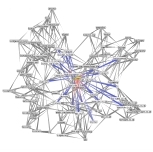When Answers Are Cheap
The technium seems to breed a view of the world that reduces the world into parts. The better our tools, the more exact our measurements. The more successful our precision, the more we think in terms of parts. The goal of science has been to isolate the parts in order to test them, and by testing them, understand them. Good science means eliminating elements that distract or cloud from the focused items we are looking at. We use science to reduce big hairy complex things to simple toy models in order to grasp their essence. If any holistic understanding arises from our reduction studies it is usually reached by assembling the data derived from collecting the parts into one large whole.
As technology steers us toward the intangible, toward software and ideas, the parts that we pay attention to have turned into “bits”, portions so tiny that they are mere nothingness, an invisible charge on or off, or a single word, yes or no. Yet when we confront the wonder of a complex organism like a mongoose, or a coral reef, or a human mind, we find it difficult to find the wholeness, the integrity, the very life of that unique thing in myriad “bits” no matter how many or well organized.
There are problems with this approach to understanding the world because very complicated being and behaviors are synergetic – they are wholes that are greater than the sum of their parts. The classic example is the bee hive. The behavior of a hive of bees is found nowhere in any part of the hive. It is not found in an individual bee (the part), it is not found in a bunch of bees. It can only reveal itself when the bees co-create a hive. Thus, there is something in a hive that cannot be found by examining bees or the parts, no matter how carefully, thorough or scientific it is done.
Nowhere is the tendency to reduce the world to foundational bits (bits as in ghostly bodiless information) more prevalent than in the realm of digital technology. The view of the reduced bit is a common viewpoint of contemporary futurists who see the world, past, present and to come, in terms of information. It is my viewpoint, and the perspective of my own writing.
Taken to the extreme this vision of “the world is only bits” seems scary. Its binary logic leads directly to speculations about downloading human minds into silicon backups, or programming organisms from a keyboard. This highly reductionistic view of the world can appear as a fatal blindness. On the other hand, science is very useful; who can argue that reductionism is not a valid perspective?
I was reminded of this two-mindedness recently because I was reading Hans Morevac. Morevac is the duke of reductionism, the proselytizer of bits, and probably the first in line to download his mind into his robot. Yet here is what Morevac wrote:
“Most things that are experienced – this very moment, for instance, or your entire life – are far more likely to be Mind’s musings than the physical processes they seem to be.” (Robot, p.168)
That could be a quote from any holistic thinker and decrier of reductionism (say David Bohm). Yet it comes from the keyboard of Mr. Data-is-All himself. Yet I don’t think I’d have to look very hard to find more examples of holistic observations from other arch-reductionists like Dan Dennet and Richard Dawkins. And I know from personal experience that in ordinary conversations these guys are as holistic and qualitative as most of us would be because in the end they are humans with families and dreams.
So why don’t they write more about the qualitative holistic beingness of things? Here is my theory: Because they find reductionism more useful for what they are trying to accomplish. Reductionism is the stance (trance?) they go to in order to make things happen, to create new kinds of machines, to invent new ways to see, to parse, dissect and then built. One builds from parts; what are the parts?
At the same time I have personally found Morevac, Dennet, Dawkins et al perfectly capable of retreating to the poetical language of holism, and the power of metaphor as a source for ideas, for inspiration and for directions.
The problem with talking about a holistic view, or qualitative (vs. quantitative) explanations is that you are forced to be vague, uncertain, evocative, and suggestive. You won’t list the precise 1,2,3,4,5 attributes of holism, one to a line (as if they were part descriptions) because that listing itself is reductive. The co-existence and entanglement of qualities do not allow themselves to be so reduced to mere characters, as if they were independent parts. Instead, the qualitative, subjective, holistic overview demands that you paint pictures with words, hints with stories, images and metaphors. This can all still make sense (and it must) while having real integrity and power. But the power of the whole is different from the power of reduced.
Reductionism gives you answers, while holism gives you questions. No one said this better than Picasso, who is reputed to have claimed, “The trouble with computers is that all they give you is answers.” Exactly. If you want answers, you become an expert reductionist. If you want questions, however, you exercise your qualitative holistic mind, as an artist would.
As we have gotten really good in the reduction mode, making lots of computers, lots of knowledge, answers are becoming cheap. In fact someday answers (correct answers!) will be so cheap that the really valuable things will be questions. A really good question will be worth a thousand correct answers. I don’t mean that metaphorically. I mean that in the marketplace. Good questions will cost more than good answers.
 Almost every imaging that I’ve seen of where the technium is headed points toward more science, more information, more answers. If we had to point out where the future is erupting into the present, most of us would say that a peephole into what is next can be found in Google. Google is the world’s brain. It is the product of reduction technology and what it provides most of all is answers.
Almost every imaging that I’ve seen of where the technium is headed points toward more science, more information, more answers. If we had to point out where the future is erupting into the present, most of us would say that a peephole into what is next can be found in Google. Google is the world’s brain. It is the product of reduction technology and what it provides most of all is answers.
If Google (or whatever brand name we want to call this function) continues to progress, someday it might offer perfect search. I’ve been trying to rehearse a world of perfect search by employing a personal researcher (a human) to explore what life is like if you can get an immediate answer to any question you have.
My experience so far suggests that perfect search generates more questions than it answers. Each question that gets answered immediately, at once generates 3 to 5 new questions. While the search machine can expand answers infinitely, our time to absorb them is limited. It is a little like factoring numbers in encryption; there is an asymmetry in the work needed to multiply a number, verses the work need to unmultiply, or factor it. Same with questions. There is an asymmetry in the work needed to generate a question verses the work needed to absorb an answer. So at the end of the day in a world of perfect search, in a world of total reductionism, we leave with more unanswered questions than when we started.
Secondly, because of the scarcity of answer absorption, perfect search becomes a quest for the perfect question. Basically answers become cheap and questions become valuable – the inverse of the situation now. The best questions are not questions that lead to answers – since they are cheap and plentiful – but to other good questions! Lately I’ve become addicted to Ask Metafilter, not because the answers are so good (they are uneven) but because the questions are so good! People in Ask Metafilter keep asking questions that I didn’t even realize I wanted to know, but once awakened, I felt I had been dying to know for years. That is a good question.
So I envision a question economy, running on a plentitude of answers. Most of these answers are generated darwinianly. Algorithms that produce answers score well in fitness criteria, and are then rewarded with more questions, and so on. Answers are made by robots, which leaves questions to be made by humans. Picasso would be happy here. In a perfect search world, humans will be paid to ask questions.
Business schools will try to teach managers how to ask great questions (since answers are free) and scientists will more and more be praised for the questions they ask. Game shows like Jeopardy will seem quaint; the new fun will be created around the gaps where there are no answers. When answers are cheap, the unknown becomes valuable.
 Indeed the end result of a perfect search world is that as fast as answers are generated and consumed, new questions come quicker with the consequence that ignorance expands. What we know we don’t know expands faster than what we know. This has been true for a while and will only continue. Science, in fact, will come to be measured as the expansion of our ignorance, rather than an expansion of our knowledge.
Indeed the end result of a perfect search world is that as fast as answers are generated and consumed, new questions come quicker with the consequence that ignorance expands. What we know we don’t know expands faster than what we know. This has been true for a while and will only continue. Science, in fact, will come to be measured as the expansion of our ignorance, rather than an expansion of our knowledge.
We ordinarily think of the progression of data, information, knowledge and wisdom to be cumulative; a ramp of escalating degrees of certainty. But in fact the mark of wisdom is that it embraces ignorance wrapped in answers. I believe a perfect search world will produce the first glimmers of global wisdom.
I don’t envision a world where answers stop coming, or reductionism diminishes. I *can* envision a world where questions become more strategic, more valuable than answers, and where therefore the ability to think in a different way, to dwell on and in qualities, to conjure up relations that supercede the parts, to grok the wholeness of things, and to inquire about meaning rather than function — I can imagine a world where this would be very valuable — for itself and as a way to keep the answers coming!


